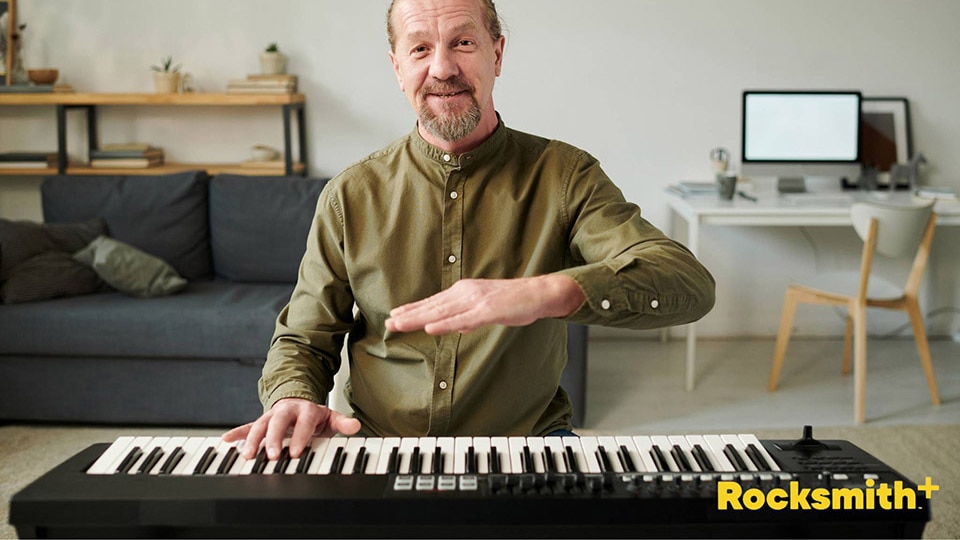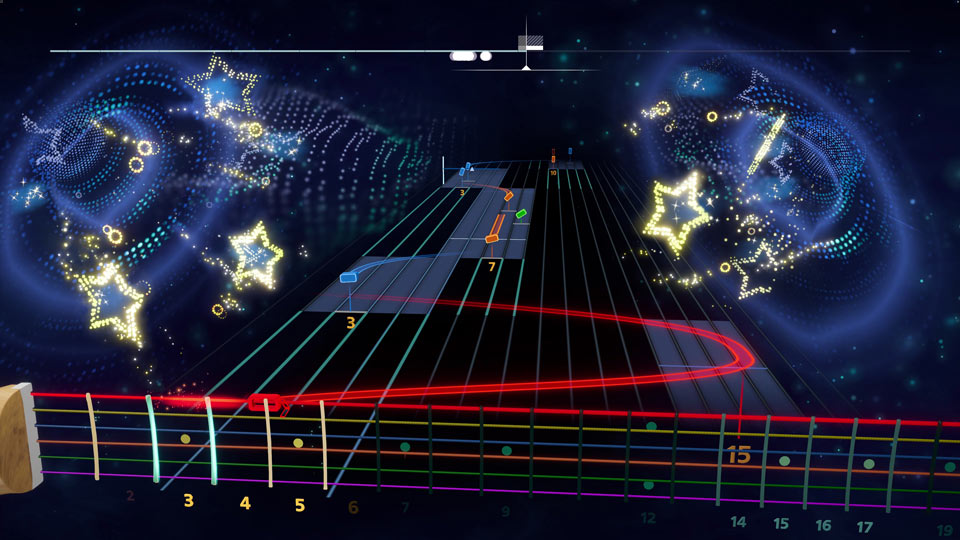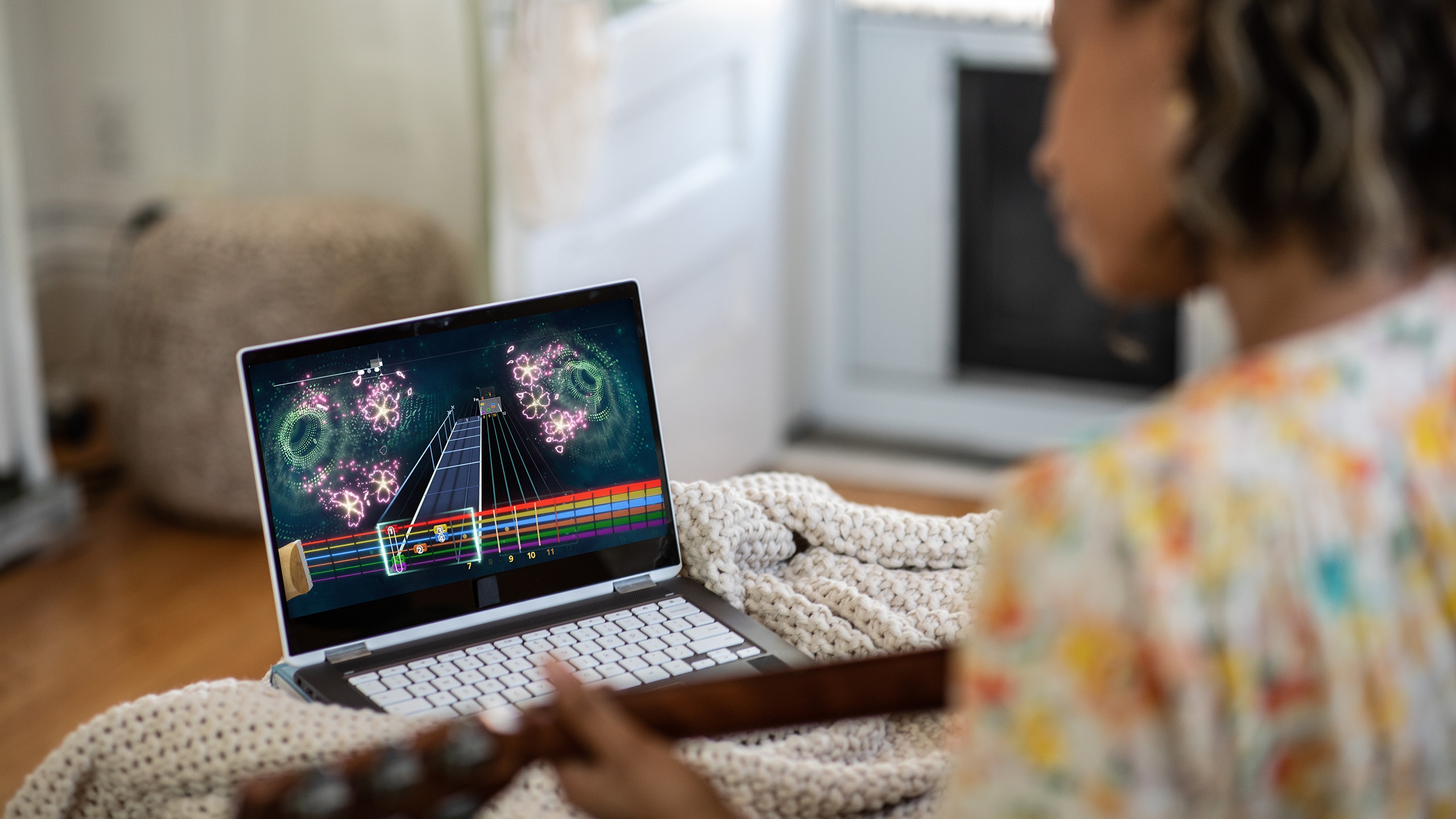Are you looking to learn how to play piano? Learning to play the piano is a fun, but potentially intimidating, journey --- with Rocksmith+, it's simplified.
Before You Play
Before you dive into jamming out on your piano, make sure your area is prepared and your piano or digital piano (keyboard) is set up correctly, allowing you to play with proper posture.
Bench Positioning
![[RS+] Online Piano Lessons: Master the Keyboard SEO ARTICLE - bench positioning](http://staticctf.ubisoft.com/J3yJr34U2pZ2Ieem48Dwy9uqj5PNUQTn/4fsRDIeG4LPCGc0rxG42Mu/dc58893c5f32b1e5eb756f92dd7c7555/2.jpeg)
Before you even touch the keys as a new piano learner, ensure that your bench is positioned correctly. Sit at the center of the bench, allowing your hands to naturally rest on the keyboard. Your feet should be flat on the ground, with your knees making a roughly 90-degree angle.
Straight Back
![[RS+] Online Piano Lessons: Master the Keyboard SEO ARTICLE - straight back](http://staticctf.ubisoft.com/J3yJr34U2pZ2Ieem48Dwy9uqj5PNUQTn/mBKjS8jS2pGot9oqvncLW/f56199f1751c45f29f10f1df2f825abb/align.jpeg)
Imagine a string pulling you up from the top of your head. Your spine should be straight, with your back neither too stiff nor slouched. This position allows your hands and fingers to move freely and reduces the risk of back strain during extended piano-playing sessions.
Arm and Hand Placement
![[RS+] Online Piano Lessons: Master the Keyboard SEO ARTICLE - arm and hand placement](http://staticctf.ubisoft.com/J3yJr34U2pZ2Ieem48Dwy9uqj5PNUQTn/70dBPPBru8AuELN9exJXtO/927b6ce9620bb9f5470874486f7a3e18/elder.jpeg)
Your elbows should be slightly above the keyboard, allowing your hands to form a natural, relaxed curve. Your fingers should strike the keys in a curve --- play with the tips of your fingers, with your thumb playing on its side. This posture promotes nimbleness and ensures each keypress is firm and controlled.
Wrist Alignment
Let your arms rest comfortably over the piano keys, staying relaxed and stress-free. Keep the position of your harms horizontal to the floor, and maintain a slight bend in your rest. Make sure to keep your wrist lower than your knuckles when playing in order to prevent undue strain.
Foot Placement
![[RS+] Online Piano Lessons: Master the Keyboard SEO ARTICLE - foot placement](http://staticctf.ubisoft.com/J3yJr34U2pZ2Ieem48Dwy9uqj5PNUQTn/4xy60LfxB9TiUmMe1zNmyC/d42597fbeaf84d870bc76aff94d425a0/foot.jpeg)
If using pedals, the ball of the foot should rest on them, with the heel touching the floor. For those not yet using pedals, keep your feet flat on the ground to maintain balance.
Regular Breaks
Even with the perfect posture, playing for extended periods can be strenuous. Incorporate regular breaks to stand, stretch, and rest your hands and back. This not only helps prevent physical strain but also keeps your mind sharp and focused.
Eye Level
![[RS+] Online Piano Lessons: Master the Keyboard SEO ARTICLE - eye level](http://staticctf.ubisoft.com/J3yJr34U2pZ2Ieem48Dwy9uqj5PNUQTn/4DLgnD3PqEzQNE4LOVh5A1/7e3f141772804f6eb61f613a2a521a97/eye.jpeg)
If you're sight reading from sheet music or following along with video lessons, position your music stand or device so it's at eye level. This way, you won't need to bend your neck up or down, preventing neck strain.
Why Does Proper Posture Matter?
In addition to preventing potential injuries and strains, maintaining an effective playing posture enhances your piano learning experience by:
- Facilitating Finger Agility: Proper hand and arm positioning allows for faster and more precise keypresses.
- Promoting Endurance: Correct posture means less unnecessary strain, letting you play for longer periods without fatigue.
- Enhancing Sound Quality: With the right posture, you're better positioned to exert even pressure on the keys, leading to consistent and harmonious sound production.
Learn at Your Own Pace
![[RS+] Online Piano Lessons: Master the Keyboard SEO ARTICLE - learn at your own pace](http://staticctf.ubisoft.com/J3yJr34U2pZ2Ieem48Dwy9uqj5PNUQTn/67G5xDz9HlR1HxaFm42FDK/4129201b36d88f38938a8203426e4c97/child.jpeg)
Unlike traditional piano lessons with a piano teacher, learning to play piano with Rocksmith+ allows you to learn at your own pace. With step-by-step tutorials and interactive learning, you can have fun while learning piano and playing popular songs.
Learn the Basics and Theories
With piano courses for all levels, you can start at a point where you feel comfortable. When in doubt, you can jump back into those music lessons you need a reminder on. This is great for beginner and advanced piano players, as you can find where you excel or need improvement and customize your learning plan.
Track Your Progress
Learning to play an instrument is a life-long learning process, full of new techniques, styles, genres, and in-depth music theory.
While you're learning, Rocksmith+ provides instant feedback to the piano player based on their current player level and skill base. This allows you to try your favorite songs while understanding in real-time where you may have missed a note, chord, or rhythm. You can then jump right back into that song to nail those parts and perfect your playing.
Play When You Can
Life can be hectic; everyone has different things to get done and schedules to follow. With Rocksmith+, you play whenever you have time.
Want to practice at 5 a.m.? Load up your computer and load up those classical pieces. Did you get off work late and want to practice at 11 p.m.? Without the need for face-to-face teachers, our online courses allow you to practice and learn anytime, anywhere.
More Than Just the Classics
When learning with in-person lessons from a teacher, you're likely restricted to the style and genres they enjoy. This means you could get stuck playing nothing but classical music during your classes.
With Rocksmith+, you can learn and play classical piano pieces and modern jams alike. This allows you to learn with your favorite songs while learning from other genres and styles when you feel you're ready.
Advance With Your Skills
As you progress from a complete beginner to an established player while you learn piano online, you can amp up the complexity of your lessons to continue learning while always returning to the fundamentals. While you play along with your favorite songs, your skill level will increase as you continue to feel comfortable with your instrument and playing.
This includes:
- Improvisations
- Chords
- Solos
- Fills
- Ear training or the ability to play by ear
Have Fun
Sure, it's difficult and time-consuming to learn a new instrument, but it's all about having fun and expressing yourself.
Here's how Rocksmith can make learning fun:
- Try New Genres: Have you ever considered playing rock, pop, or even rap on the piano? What are you waiting for? With Rocksmith+, you can play less common piano genres on the piano.
- Challenge Your Friends: Are you the best piano player of your friends? Show 'em how it's done with the scores presented at the end of every song. You will also increase player levels over time, showing that you are the top dog.
- Just Jam: There's nothing stopping you from just having fun. Pick songs you think are fun or silly, and just start playing. While playing Rocksmith+, you're playing real songs on a real instrument, allowing you to really play those songs even when you're away from the game.



